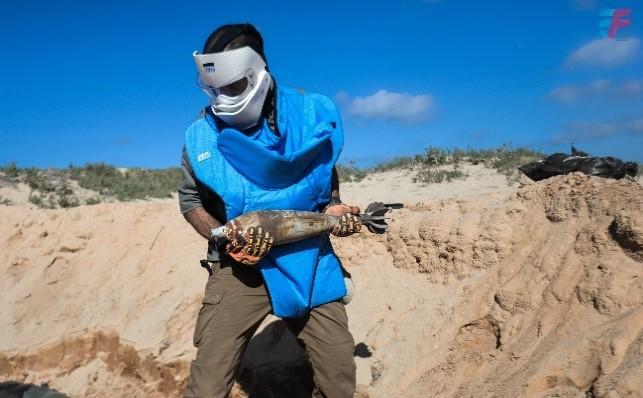
This article is dedicated to Tarek Farhat and Houssam Madi from 3F who tragically lost their lives during a demining operation in Tripoli in July 2020.
Rabie al-Jawashi says he has time for three things in his life: demining, sleeping, and hobbies. In reality, most of his time is taken up by demining.
This is not surprising. According to a recent statement from the United Nations Mine Action Service (UNMAS), Libya has the world’s largest uncontrolled ammunitions stockpile, with up to 200,000 tons of explosives scattered across Libya. Demining NGOs working in Libya estimate that there may be even more. Rabie’s organisation – the Free Fields Foundation (3F) – is a Libyan mine action NGO based in Tripoli that has made it its mission to remove the hazardous material so Libyans can finally return to normal life after years of conflict.
In early 2012, 3F consisted of seven volunteers. Today, Rabie leads 3F with 60 dedicated full-time staff members. The Danish Demining Group has played an important role in this growth, providing essential technical support and mentoring to 3F since 2015, with support from the European Union. 3F is now accredited by the Libyan Mine Action Center (LibMAC) and is considered one of the leading mine action organisations in Libya.

3F and DDG teams in 2016
The beginnings
Rabie’s connection to the work of 3F is personal. His uncle was killed by an unexploded bomb during the Second World War in Libya. Decades later in 2011, Rabie became a volunteer during the revolution, working to collect donations from Libyan expat communities for internally displaced persons (IDP) and refugees.
During this period, Rabie met a young girl in Tunisia who – at just nine years old – had lost both hands and had her face disfigured by a landmine. Her parents struggled to pay for her treatment and Rabie offered to cover their costs and promised to raise more money for surgery. He spent weeks collecting money. Finally, when he collected enough, he returned to find her bed empty. She had passed away.
Upon his return to Libya, Rabie received an unrelated call from a friend who needed help with translation and logistics for some demining work in Libya. Without hesitation, Rabie knew this was what he had to do.
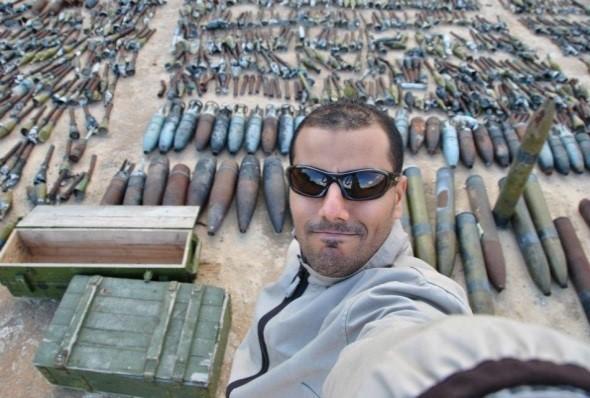 |
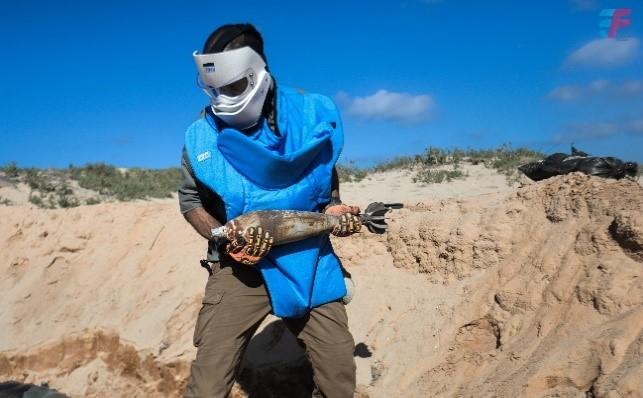 |
Rabie’s first visit to the field (left) and during the first bulk demolition in Sirte 5 years later (right)
Safety first
The need for demining work in Libya is great. According to the Landmine and Cluster Munition Monitor, explosive ordnance caused 2,848 casualties between 2015 and 2018. In 2020 alone, the LibMAC documented 179 causalities. It is most often ordinary citizens, especially those already displaced, who pay the price of years of conflict that have left behind explosive remnants of war.
In July, Rabie lost two members of his own team, Tarek Farhat (31) and Houssem Madi (41), when they stumbled across an improvised explosive device (IED) hidden inside a house. The IED detonated and killed them both. Tarek and Houssem had been working with 3F for five and three years, respectively. While 3F’s team is trained on how to identify, secure, and safely dispose of explosive ordnance, IEDs are extremely hard to spot and there always remains a high risk during clearance operations.
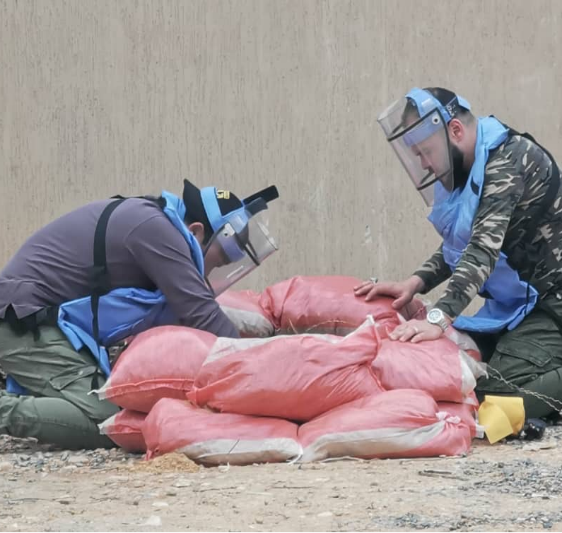
3F colleagues Houssem Madi (left) and Tarek Farhat (right) lost their lives during a demining operation in July
Rabie is proud of his team but he knows all too well that they risk their lives each day. “We are not collecting tulips but explosives! Everything runs smoothly until the first mistake.” De-mining staff have to undergo regular training with a demanding certification process. Essential knowledge includes technical aspects of explosive ordnance search and removal but also risk management and casualty evacuation.
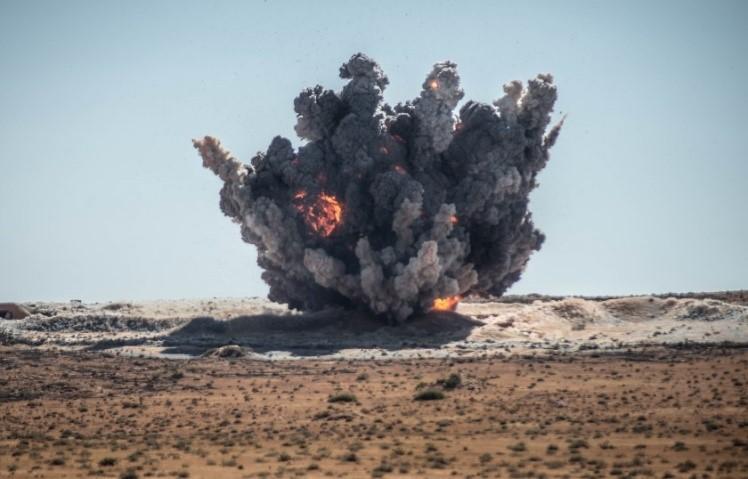
Recent Bulk Demolition conducted near Tripoli jointly by the Army Engineers and 3F
Despite all the risks connected with demining work, Libyans across the whole country are taking action because, as Rabie says, “We are all people, regardless of politics.”
Power is in the community
3F is currently working in Benghazi, Misrata, Tawergha, and Tripoli. Between January and August 2020, 3F removed 1055 pieces of explosive ordnance and cleared more than 50,000 square meters of contaminated land.
In Tawergha, Rabie’s organisation is helping displaced families return to their homes where mines and other explosive ordnance lie in wait for unsuspecting children playing in the yard.
Rabie’s colleagues, Salma and Omar, who work for 3F as community liaison officers in Tawergha, are well-known faces in what was a ghost town only two years ago. They provide valuable guidance to returning families on what to do if they find explosive ordnance around their homes and are quick to arrive to dispose of them safely.
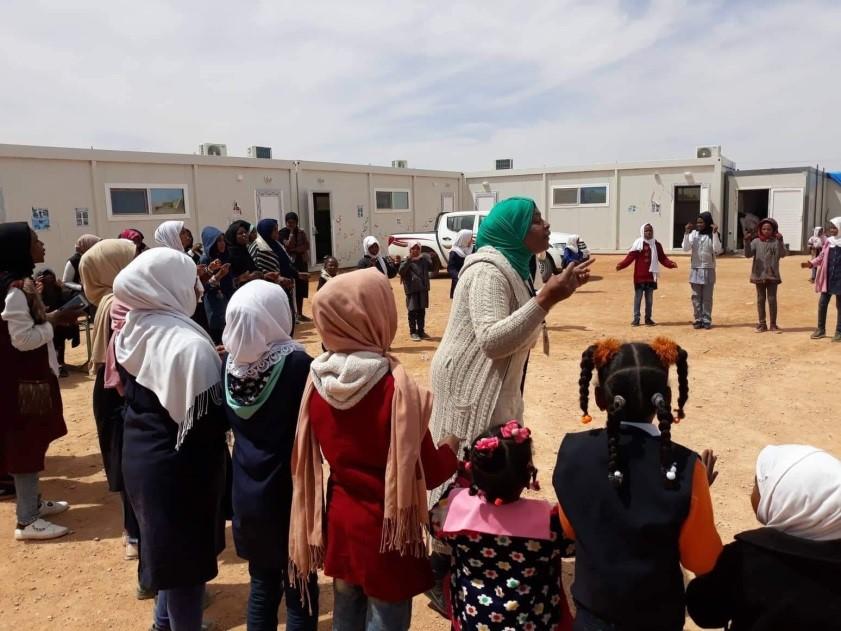
Salma leading a group of children during a Risk Education Session
As one resident of Tawergha put it, “because of 3F’s work, people are now aware of how important it is to not touch any suspected explosives. They immediately call [3F staff] to report suspicious objects so they can inspect and remove them.”
3F relies on the engagement of local communities to conduct their work. The NGO recently recruited 12 volunteer members from within Tawergha IDP camps. These staff coordinate closely with local schools and educate children on the perils of explosive ordnance.
Rabie believes more Libyans need to be involved in demining efforts. As he says, “Those who have a personal connection to a place will always be the most engaged to help their communities”.
The European Union, under the Instrument contributing to Stability and Peace managed by the Service for Foreign Policy Instruments, is currently supporting three projects focusing on demining efforts and on building capacities to remove explosive ordnance in Libya. This is done in partnership with Dan Church Aid, Halo Trust, the Danish Demining Group/Danish Refugee Council, Free Field Foundation (3F) and B&S Europe.
